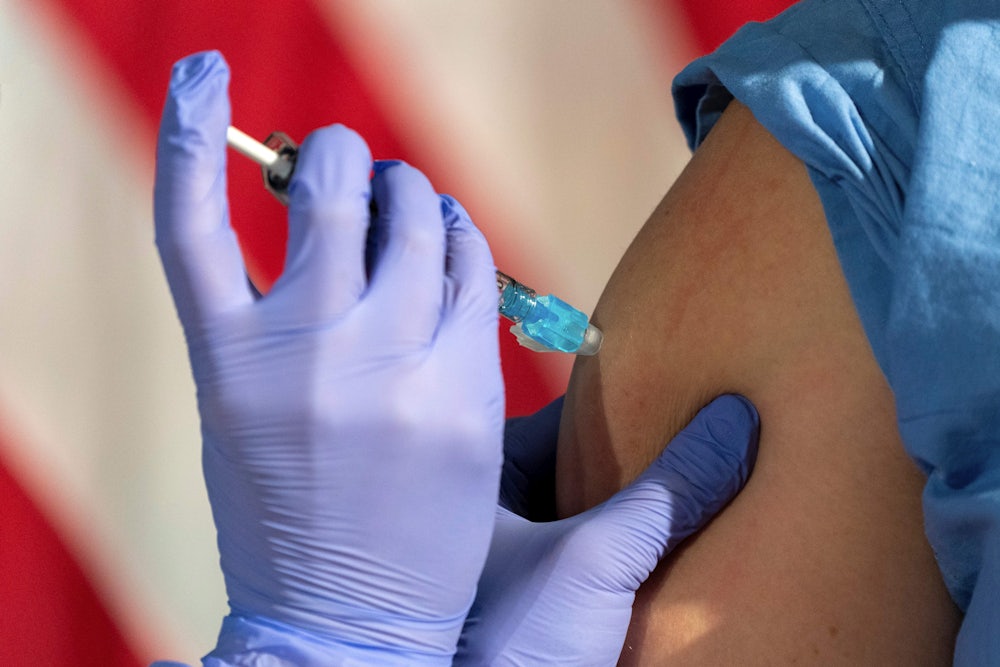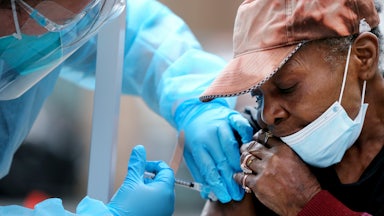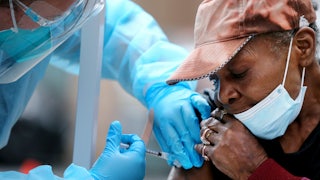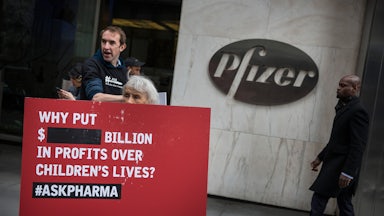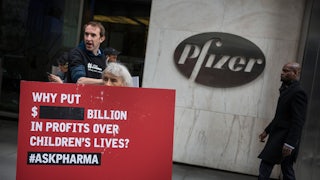If you support mandatory vaccination to fight Covid-19, you are in good company. The first vaccine mandate in American history came from none other than George Washington at the height of the American Revolution. America’s struggle for independence coincided with a major smallpox epidemic that raged through North America in the 1770s and 1780s, and it was an omnipresent threat to the ragtag Continental Army.
“By January 1777 [Washington] ordered Dr. William Shippen to inoculate every soldier who never had the disease,’” historian Ron Chernow wrote in his 2010 biography of the first president. “‘Necessity not only authorizes but seems to require the measure,’ [Washington] wrote, ‘for should the disorder infect the army in the natural way and rage with its usual virulence, we should have more to dread from it than the sword of the enemy.’ This enlightened decision was as important as any military measure Washington adopted during the war.”
Washington’s fears were far from hypothetical. Until the twentieth century, disease outbreaks could be as deadly for the average soldier in the average war as the average enemy combatant. Chernow noted that British generals released infected civilians and captives toward American lines at the siege of Boston and at Yorktown, in a ghoulish preindustrial version of biological warfare. Fighting smallpox and fighting the British, in Washington’s eyes, were one and the same.
Anti-vax groups often allude to basic American values to resist vaccine mandates, asserting that they have the liberty not to take steps to ensure they don’t spread infectious diseases to other people. Public health officials, in their version of events, are derided as authoritarian and tyrannical figures. This juvenile worldview could not be more backward. Getting vaccinated is as American as baseball and apple pie—and so is compelling those who refuse to do so voluntarily.
When Covid-19 vaccines became widely available this spring, the immediate priority was ensuring that those who wanted to get the vaccine could do so. Millions of Americans did their patriotic duty to one another and rushed out to get the jab. But millions of their fellow citizens did not. In May, President Joe Biden set a goal of 70 percent vaccination among adults by July 4, once again linking American independence to a mass vaccination campaign. As of the end of July, however, only 69 percent of Americans have so far received at least one shot, and only 60 percent can be described as fully vaccinated.
These vaccination rates are, unfortunately, not evenly distributed throughout the country. States in New England are leading the pack: Vermont, for example, has given at least one dose to nearly 87 percent of adults in the state and fully vaccinated 77 percent of them, with Connecticut and Massachusetts close behind. (A recent CNN report on how Vermonters are enjoying their regional herd immunity shows how the vaccine is pretty successful at fully unleashing what Americans might call “freedom.”) In the southern and central portions of the country, things are far worse. Mississippi has yet to administer at least one dose to more than 50 percent of its adult population, and 10 other states also haven’t yet fully vaccinated a majority of their adults.
Some of these shortfalls can be attributed to equity problems. But many more can be blamed on culture-war nonsense or sheer stubbornness. My personal patience with the “vaccine-hesitant” ran out when I read a ProPublica article last week about eldercare workers who refuse to get vaccinated. Covid-19 is particularly dangerous for elderly Americans, who make up the bulk of the American death toll from the virus so far. Their excuses were as unpersuasive as they were callous. “This is just a personal choice and I feel it should be a free choice,” one of the nurses told ProPublica. “I think it’s been forced on us way too much.” It has not, but it should be.
As with every other aspect of American life, some of this “hesitancy” has led to litigation against real or imagined vaccine mandates. Fortunately, vaccine mandates are undoubtedly constitutional. In 1902, the town of Cambridge, Massachusetts, experienced a major smallpox outbreak. Its public health board issued an order for everyone in the community to get a vaccine if they didn’t already have one or pay a $5 fine. Henning Jacobson, a Swedish immigrant who feared a bad reaction to the vaccine, refused the order for himself and his children. He sued Massachusetts, arguing that the state’s mandatory-vaccination law had violated his constitutional rights.
Three years later, in a 7–2 decision, the Supreme Court flatly rejected his stance. States wield what the court called the “police powers”—the basic powers of any community to regulate its own health, safety, and general welfare. Mandatory vaccination, especially in an age of plagues and pandemics, fell well within these powers. “The liberty secured by the Constitution of the United States to every person within its jurisdiction does not import an absolute right in each person to be, at all times and in all circumstances, wholly free from restraint,” the court wrote. “There are manifold restraints to which every person is necessarily subject for the common good.”
It’s here that we should note that mandatory vaccination doesn’t mean forcible vaccination. Biden won’t be sending troops door-to-door with those tranquilizer guns from Jurassic Park to shoot vaccine-laden darts into unsuspecting civilians. What it does mean is that those who refuse to get the vaccine despite a mandate will face certain consequences for it, such as regular Covid testing or denial of entry into certain places. The private sector has even more leeway to impose consequences on workers who won’t get vaccinated: A Texas hospital system ousted more than 150 health care workers earlier this summer who had refused to get the shot.
Such is the nature of living in civilization. “There is, of course, a sphere within which the individual may assert the supremacy of his own will, and rightfully dispute the authority of any human government, especially of any free government existing under a written constitution, to interfere with the exercise of that will,” the Supreme Court wrote in Jacobson. “But it is equally true that in every well-ordered society charged with the duty of conserving the safety of its members the rights of the individual in respect of his liberty may at times, under the pressure of great dangers, be subjected to such restraint, to be enforced by reasonable regulations, as the safety of the general public may demand.”
For all the anti-vaxxers’ talk of liberty and personal freedom, the nature of pandemics and infectious diseases means that everyone else is forced to suffer for their short-sightedness. Covid-19 has imposed its own subtle tyranny upon our lives for the past 18 months. Even if they do not get sick and die, people have been unable to find work, to meet family and friends, to go on dates and fall in love, to hold weddings and funerals, and to enjoy the full blessings of everyday life without risking their own health and the health of others. If anti-vax folks mistake a key for a shackle, that’s only because their selfishness is part of the problem.
This dilemma, too, the Supreme Court once foresaw. “We are not prepared to hold that a minority, residing or remaining in any city or town where smallpox is prevalent, and enjoying the general protection afforded by an organized local government, may thus defy the will of its constituted authorities, acting in good faith for all, under the legislative sanction of the state,” the justices wrote in 1905. “If such be the privilege of a minority, then a like privilege would belong to each individual of the community, and the spectacle would be presented of the welfare and safety of an entire population being subordinated to the notions of a single individual who chooses to remain a part of that population.”
Washington, for his part, had some sympathy for vaccine-hesitant individuals. His wife, Martha, had become one of them after witnessing her son Jacky’s adverse reaction to smallpox inoculation when he was young. As a result, as Chernow noted, she did not enter Boston after the Continental Army liberated the city, for fear of catching smallpox from one of the town’s residents. But she eventually yielded under pressure from her husband and out of wartime necessity. After a slight fever and a brief quarantine, she was safe. The Covid-19 vaccines are substantially more safe when compared to smallpox inoculation—and the rewards for mandating them will be just as great.
